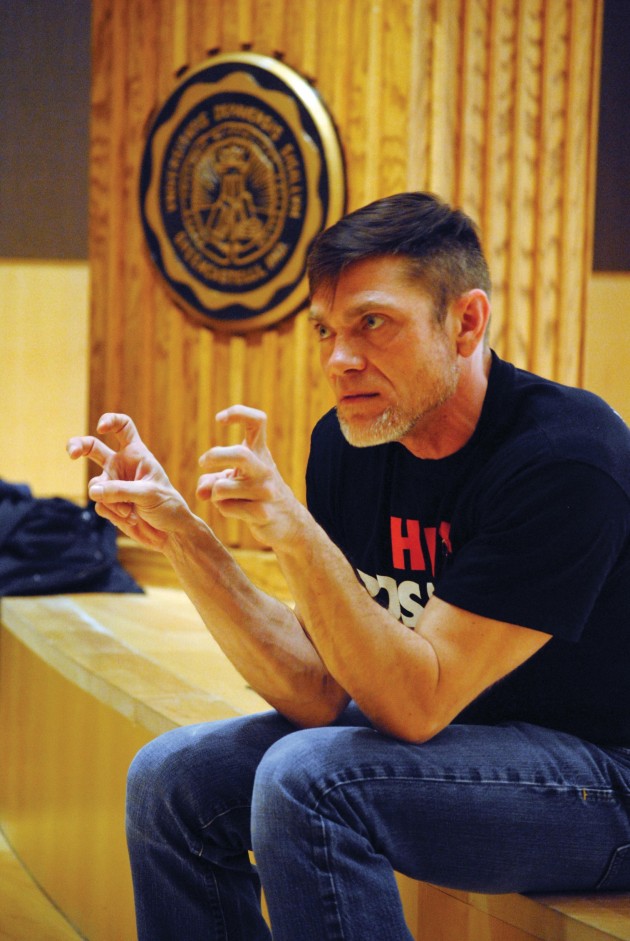
A class of freshmen passed out hot chocolate, candy and condoms Wednesday and Thursday hoping to raise awareness and initiate conversations about HIV/AIDS.
Assistant professor of sociology Alicia Suarez led a first-year seminar dealing with the sociological implications of HIV/AIDS and helped students to organize a series of events over the two days as a final project for the class.
Suarez said the group's overall goal of generating awareness was achieved, even though some events had a low turnout.
"I think there is visibility on campus and there are people wearing red ribbons and there are people wearing stickers and eating candy that has little AIDS facts on it — and even that, even if they're just eating a Kit-Kat and read that, that's something," Suarez said.
Freshman Jonathan Reyes is a student in the seminar who participated in coordinating the events. He said low participation may reflect the busy schedules of DePauw students as well as the controversial topic.
"HIV/AIDS has a stigma attached to it, so I think some people feel uncomfortable coming to the events," Reyes said.
Another member of the class, freshman Richard Walsh, said that as long as the event brings attention to the issue they have achieved success.
"All we're trying to do is create awareness and with every person we talk to, every person we interact with — everybody," Walsh said. "And they're starting to realize that this disease has an impact on everyone."
The awareness campaign included events such as handing out hot chocolate, tabling at the Hub, an AIDS walk, a discussion with a speaker who has AIDS and a discussion about safe sex entitled "Sexy Time."
Neil Carnes, the speaker with AIDS, discussed his experience working in AIDS prevention campaigns and about his personal journey in accepting himself as a homosexual man. In discussing his experience working to spread awareness about HIV/AIDS to "sex workers," Carnes said the concept of safe sex was very different and the language used to address sex was very deep in meaning.
"F***ing without condoms is an occupational hazard, now that's if they've got the right pimp," Carnes said. "If you switch that, f***ing without condoms is more money. See how that nuance just changes so quickly?"
Carnes openly described his sexual experiences that led to his contraction of HIV and accepted any questions audience members offered. Carnes said being open about the topic of HIV/AIDS is important, because often, people choose not to talk about the virus.
"When it concerns HIV/AIDS, we are not talking about just any other disease. It's not. In some respects, certainly it has become a chronic illness in many, many, many respects, but who is getting this disease?" Carnes said. "Globally, nationally and locally are not the most digestable people, let's just put it that way."
Suarez also said that the virus and the implications of the virus often go unmentioned and that led her to focus her curriculum on the national impact of the illness.
"I focus very much on the United States because I think that we still have a million people with HIV, and there are new cases all the time. It's not something we're talking about especially their generation," Suarez said.
In describing student reactions to the AIDS day events, Suarez said the reaction did not meet her students' expectations.
"I think people were pretty receptive. Some students seemed a little freaked out by the stickers," Suarez said. "I think my students are always surprised by how freaked out some of their peers are."
The group distributed various stickers with messages including "Know Your Status" and the more controversial "Don't get Sick, Wrap Your Dick."
Freshman John Yates said the idea for the stickers emerged from efforts to create a slogan that would gain interest and spread their message.
"It's a very popular slogan. Everyone's loving it," Yates said. "When we were contemplating ideas, we were trying to come up with an idea that would raise awareness, but I mean, we're college kids."
The freshmen in the first-year seminar made up a large part of the participants in each of the events. Many expressed excitement about the success of the events and said they were pleased they decided to enroll in the course.
"When I was scheduling classes I came across this seminar and recently, a couple months before I had an uncle who had passed away from AIDS," Walsh said. "As an individual that's gay I am connected to a community that is very much affected by HIV/AIDS, and I have become scared for my life of possibly contracting HIV."
Reyes said he wanted to take the course in order to learn about the disease and to share information with others.
Yates mirrored Reyes' sentiments, stressing that the fight to raise awareness was not over.
"Until we find a cure, we are not done raising awareness about this issue," Yates said.


